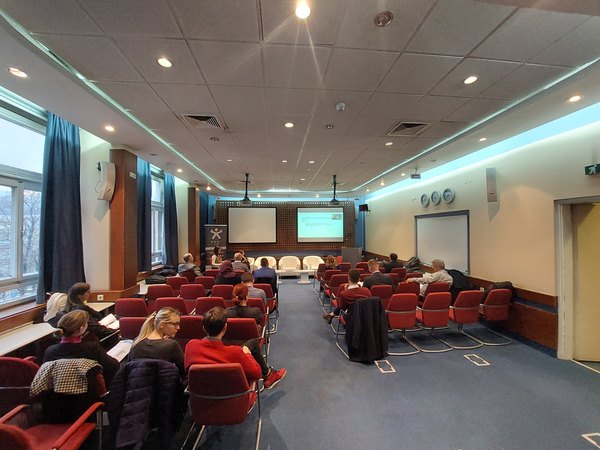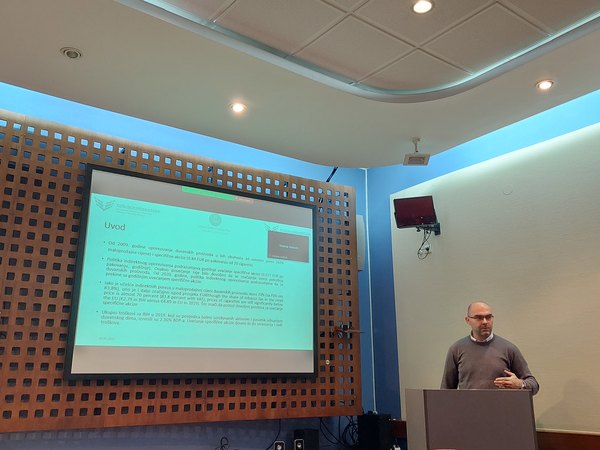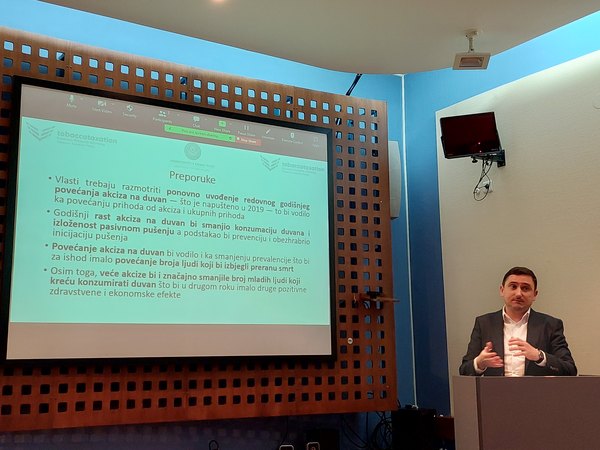
- Roundtables
- Skopje - December 2023
- Podgorica - December 2023
- Belgrade - October 2023
- Tirana - October 2023
- Banjaluka - May 2023
- Montenegro - December 2022
- Sarajevo - December 2022
- Sofia - November 2022
- Skopje - November 2022
- Beograd - November 2022
- Tirana - September 2022
- Banja Luka - April 2022
- Skopje - December 2021
- Belgrade - November 2021
- Tirana - October 2021
- Montenegro - September 2021
- Albania - December 2020
- Skoplje - December 2020
- Beograd - December 2020
- Banja Luka - November 2020
- Podgorica - November 2020
- Podgorica - December 2019
- Prishtina - November 2019
- Belgrade - November 2019
- Banja Luka-November 2019
- Belgrade - December 2018
- Podgorica - November 2018
- Banja Luka - November 2018
- Prishtina - November 2018
- Tirana - November 2018
- Skopje - November 2018
- Zagreb - October 2018
TOWARDS MORE EFFECTIVE TOBACCO CONTROL POLICIES
Venue: School of Economics and Business, University of Sarajevo, Sarajevo
Date: 07.12.2022.
On Wednesday, December 7, 2022, the University of Banja Luka (Centre for Development and Research Support) organized a presentation of research results and panel discussion in collaboration with PROI Association. The event has gathered 19 participants, including research team members, coming from WHO Office in B&H, Public Health Institute of FB&H, Indirect Taxation Authority, civil society organizations (PROI, Association for addiction prevention NARKO-NE), Directorate for European Integrations B&H, School of Economics and Business University of Sarajevo, EU Delegation to B&H, and Youth Advocacy Board (established by PROI).
After the welcome address and introductory presentation about the project, researchers presented the key findings from the study on the economic burden of smoking in Bosnia and Herzegovina (B&H), as the first of a kind providing comprehensive estimation of the total costs of smoking providing reliable evidence for further improvements in tobacco taxation policies. Additionally, researchers presented the results of the modelling tobacco excise tax and its effects on tobacco taxation revenues and effects on public health.
B&H ranks 11th in the world in terms of smoking prevalence, with prevalence of 41%. Of all people who died in B&H in 2019, about 64% were caused by smoking-related diseases (24.654), among which 20% are smoking-related deaths (5.058). The study shows that:
- Direct costs of smoking, i.e. the value of goods and services consumed by smokers as part of health care treatment of a smoking-related disease, are estimated between 557 – 766 million BAM.
- Indirect morbidity costs, i.e. the value of lost productivity by persons who are sick or disabled for work due to smoking-related diseases, are estimated between 51 – 67 million BAM.
- Indirect mortality costs of smoking, i.e. the value of lives lost due to premature death caused by smoking, are estimated between 111 – 141 million BAM.
Furthermore, the modelling of tobacco excise tax and its effects shows that the gradual and continuous increase of tobacco excise tax has positive effect on the increase of tobacco tax revenues, as well as on public health through decrease of prevalence, decrease of premature deaths caused by tobacco consumption, as well as decrease of smoking intensity.
Key recommendations for policy makers were presented as well:
- The government should reintroduce the regular annual increase of the tobacco excise tax —which was abandoned in 2019.
- The government should stop considering tobacco excise as a revenue instrument, but instead use it as a tool to decrease tobacco use and allocate the revenues toward public health, including tobacco control.
- The government should improve the implementation of other tobacco control measures.
- Heath Insurance Funds should provide increased resources for comprehensive cessation programs.
- The government should mandate recording of smoking status in the health file of every patient, so costs of tobacco can be tracked better.
The pannel discussion followed with key points addressed by the representative from the Public Health Institute of Federation of B&H, Indirect Taxation Authority of B&H, PROI Association and University of Banja Luka. The public health sector and indirect taxation representatives stressed that the research presented is highly useful for further argumentation for the changes of the legislation and practices, e.g., improving tobacco control. Useful information from the ITA representative was provided in terms of that there is a plan for passing of the new Law on Excise Duties in B&H in the following two years and the research results presented provide solid arguments for the increase of excise. Additionally, all participants have agreed that there is a need for stronger communication and collaboration on all sides: academia, government (e.g., ITA, ministries, parliaments) and civil society - to be able to bring about significant changes.







